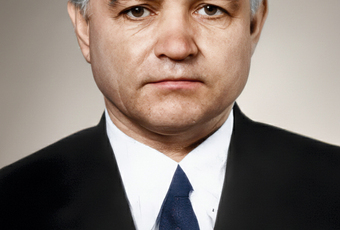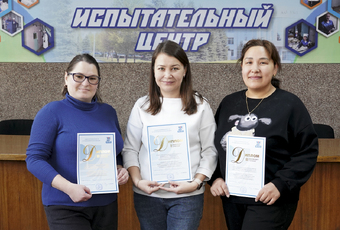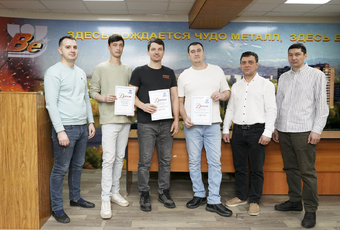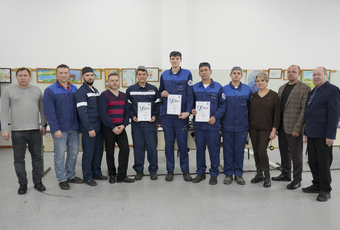Bringing victory as closer as you could…
Bringing victory as closer as you could…
The wartime will always be echoing in the souls of those who participated in the Great Patriotic War. There are 3 veterans, one concentration camp prisoner as a child, as well as 568 home front workers, who will celebrate the Victory Day together with the whole staff of Ulba Metallurgical Plant.
Hundreds of former soldiers, when back from the front, participated in the construction and establishment of Ulba Metallurgical Plant. Front-line workers were entrusted with the most difficult areas of work. Thus, only veterans of the war worked as operators at regeneration of potassium fluorotantalate and potassium fluocolumbate crystals with sodium, and only during day shifts. The site was quite dangerous due to explosion hazards...
Every year Ulba plant provides a financial support to its dear veterans for the Victory Day. In 2020, over KZT 5,600,000 were allocated for these purposes. Before the holiday, Ulba»s Personnel Corporate Culture Department staff visited the participants of the Great Patriotic War with congratulations.
OUR WINNERS
Pimenova Tatyana, January 26, 1924
Tatyana Andreevna was ordered to active duty in the Red Army in 1942. She took part in the battles at the North Caucasus Front. She was awarded II degree Patriotic War Order for combat merits, as well as anniversary medals. From 1961 through 1979, she worked at Ulba Metallurgical Plant as operator of machine accounting station.
Leskin Yevgeniy, January 1, 1924
In November 1942, having received the military profession of radio-operator gunner, Yevgeniy Emelyanovich was transferred under Leningrad. After lifting the blockade, Yevgeniy Leskin fought in Estonia. For his courage and heroism Yevgeniy Leskin was awarded II degree Patriotic War Orders, Red Star, III degree Order of Glory, two medals «For Courage», medals «For the Defense of Leningrad», «For Victory over Germany».
Yevgeniy Emelyanovich came to Ulba Metallurgical Plant in 1959. He worked as an operator in Beryllium production workshop, then at the warehouse.
Alexander Demidov, December 7, 1925
Alexander Feofanovich became a Red Army soldier when he was 17 years old, in February 1942. He began his service in the Soviet Army headquarters as an assistant commander of a troop. Alexander Demidov fought with Japanese at the Far Eastern Front as an assistant commander of a department in the city of Chan-Chun. Demobilized in 1948. He was awarded II degree Patriotic War Order, medal «For the victory over Japan», commemorative medals. In 1953, he came to UMP as a worker in the transport workshop. In 1969, he was transferred as operator to workshop 30, where he worked until his retirement in 1979.
Information about Ulba»s employees-war veterans is carefully collected and stored by Exhibition and Information Center of the company.
LITTLE STORIES OF A BIG VICTORY
The memories of the home front workers, who were very few years old during the war time, are so numerous and enough for a multivolume series of books. Victory was forged at the home front by their children's hands. This is only a small part of childhood stories without childhood.
Taisiya Kuzminichna Strygina lived in one of the settlements of Stalingrad region in those days. Tasya and the other girls worked in fields every day raising tobacco. In the mornings, they were taken to work a few kilometers away from the village, given a little food for the day. The tobacco had to be weeded, watered, and then carried to garrets for drying. Dry leaves were cut and sent to the front.
Boris Nikolaevich Sarayev lived in village Alekseyevka near Kharkov before the war. Before occupation of Kharkov he managed to cross the Don bridge under machine-gun fire which was then blown up. After moving to Uralsk, Boris worked in collective farm fields. From 5 a.m. till darkness, he got in vegetables, mowed hay and carried bread to grain elevator on oxen. The teenager was charged ½ workday per day.
Euist Makishevich Urazgaliev worked in a collective farm Red Partisan in Belousovka on threshing-floor, on winnowing machine, in hay field since he was 8 years old. One of the main works during the war was «Stalin's Forest Plantations». Euist and the other children planted trees around Belousovka. So many years passed and the trees are still alive.
Zinaida Yegorovna Gainudinova was a little girl when the war began. The family lived in Polyakovka, Bolshenarym district. Since 1944, our heroine began working on farms – children were engaged in winnowing, weeding fields, collecting spikelets. Zinaida Yegorovna recalls such a story. Mom just gave a birth to a brother and the children brought home collected overwintered spikelets. As she was busy with a baby, she did not have time to cook anything from them, which saved the lives of the family. Many people died after eating those spikelets.
Nonna Alexandrovna Slukina had just finished the third grade in 1941. Her mother, who raised her children alone, was mobilized to the labor front. Nine-year-old Nonna and her brother entered a state orphanage in Sverdlovsk region. The children were given responsibility to graze goats and harvest birch brooms to feed them. Nonna Alexandrovna said that the norm was 100 brooms a day. One needed to climb a tree, cut branches, tie them and dry. And goat milk was given to wounded soldiers.
Inna Grigoryevna Khodko was 5 years old when the war started. Starvation was terrible, there were poisoning. They went to work with their mother. Kid»s hands helped to sort the fish in Rybtrest and vegetables in storage. Inna Grigoryevna recalls one story with tears in her eyes. 1942, flood in Ust-Kamenogorsk, water flooded the house where the family lived. It was about to reach the top. And then the door opened and they saw the bow of the boat. She still does not know who saved the whole family as almost all men were at the front.
IMMORTAL REGIMENT WILL BE!
The initiative to post photos of heroes of the Second World War on balconies and windows of the houses belongs to Ludmila Bufatina, Trade Union member of UMP JSC.
This idea was actively supported by members of the Trade Union, pensioners of Ulba Metallurgical Plant and young people of the Youth Association. Residents of 28 houses in different districts of the city have already expressed support for the campaign.
Ludmila Vagizovna shared the idea so that Ulba employees and all residents of the city would participate in this campaign. By putting photos in windows on May 8, 9, 10, our heroes will still meet their 75th victorious spring. There will be no solemn procession this year due to quarantine but the holiday will be in our hearts. And on May 9 at 09.00 p.m. the whole Ust-Kamenogorsk will light candles in their windows to remember… Join us!
Press Office of Ulba Metallurgical Plant
Газета «Устинка плюс», №19 от 7.05.2020 г.











